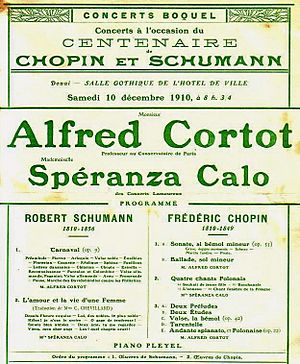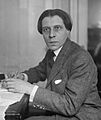Alfred Cortot facts for kids
Quick facts for kids
Alfred Cortot
|
|
|---|---|

Cortot, unknown date
|
|
| Background information | |
| Birth name | Alfred Denis Cortot |
| Born | 26 September 1877 Nyon, Vaud, Switzerland |
| Died | 15 June 1962 (aged 84) Lausanne, Vaud, Switzerland |
| Genres | Classical music |
| Occupation(s) | Pianist, conductor |
| Instruments | Piano |
Alfred Denis Cortot (CORE-toe; 26 September 1877 – 15 June 1962) was a very famous French pianist, conductor, and teacher. He was one of the most well-known classical musicians of the 20th century.
Alfred Cortot knew a huge number of musical pieces. He was especially admired for how well he understood and played Romantic piano works. He was particularly good at playing music by Chopin, Franck, Saint-Saëns, and Schumann. He also helped create special music books for almost all the piano music by Chopin, Liszt, and Schumann.
He was a very important person in French music during his time. He was also famous for being part of a piano trio with violinist Jacques Thibaud and cellist Pablo Casals.
Contents
Biography
Early Life and Studies
Alfred Cortot was born in Nyon, Vaud, in the French-speaking part of Switzerland. His father was French, and his mother was Swiss.
He studied music at the famous Paris Conservatoire. His teachers included Émile Decombes, who was a student of Frédéric Chopin. In 1896, Alfred Cortot won a "premier prix," which is a top award for musical excellence.
He performed for the first time in 1897. He played Beethoven's Piano Concerto No. 3. Between 1898 and 1901, he worked at the Bayreuth Festival. He helped train choirs and later became an assistant conductor. In 1902, he led the first performance in Paris of Richard Wagner's opera Götterdämmerung. He also started a concert group called Société des Concerts. This group performed important works by Wagner, Beethoven, and Brahms. They also played new music by French composers.
A Busy Career

In 1905, Cortot formed a musical trio with violinist Jacques Thibaud and cellist Pablo Casals. This trio became one of the best piano trios of its time. In 1907, he became a Professor at the Conservatoire de Paris. He taught there until 1923. Many talented students learned from him, including Yvonne Lefébure and Vlado Perlemuter.
In 1919, Cortot started the École Normale de Musique de Paris. His classes on how to play music were very famous. He traveled a lot for international music events. The French government even sent him on tours to the United States and the Soviet Union in 1920. He conducted many orchestras. He also often played the piano for other artists when they visited Paris. He continued to be involved in music until his health declined. Even in his later years, he taught special piano classes.
On March 21, 1925, Cortot made history. He made the world's first commercial electrical recording of classical music. This recording was for the Victor Talking Machine Company. He recorded Chopin's Impromptus and Schubert's Litanei.
During World War II
During World War II, Alfred Cortot took on a role in the Vichy government. This government was in charge of France during the German occupation. He became a "High Commissioner" for the arts. He also served on the "National Council" in 1941 and 1942.
Before this, he strongly supported French music. He worked with the Fine Arts administration to help soldiers with music. After a new leader was appointed, Cortot left this position. He then focused on writing reports about culture and defending French musical styles. The Vichy government put him in charge of changing music activities. He joined a committee for the professional organization of music in 1942.
He played in official concerts in Paris during the occupation. He also performed in Germany in 1942. However, he also tried to help musicians. In 1943, he argued that musicians should not be forced into labor service. He helped free twenty musician prisoners. He also worked to help Jewish musicians. For example, he helped the Polish singer Marya Freund. After she was arrested, Cortot helped her get transferred to a hospital. She survived and escaped.
After the war, a French government group found Cortot guilty of working with the wartime government. He was not allowed to perform for one year. He said that he had spent 50 years helping France. He felt he could not refuse when asked to help his fellow musicians. He believed he was helping France's interests, not just the government's. He said he was never involved in politics. After his ban ended, he went back to performing. He often played more than 100 concerts each season.
Later Years and Death
Alfred Cortot died on June 15, 1962. He was 84 years old. He passed away in Lausanne, Switzerland, due to kidney failure.
His Musical Contributions
Alfred Cortot was one of the most famous piano players of his time. He was especially known for playing music by Chopin, Schumann, and Debussy. He also created special printed versions of their piano works. These editions included detailed notes on how to play the music and how to understand it.
In his later years, Cortot sometimes had memory problems during concerts. He also sometimes played wrong notes in his later recordings. However, when he was at his best, he had an amazing technique. He could play almost any difficult piano piece. This talent can be heard in his famous recordings of Liszt's Sonata in B minor. This was the first time this important piece was ever recorded. He also impressed other famous pianists with his playing of Saint-Saëns' Etude en forme de valse.
He also wrote many educational books about playing the piano. One of his well-known books is Rational Principles of Pianoforte Technique. This book has many finger exercises. These exercises help pianists improve different parts of their playing technique.
Images for kids
See also
 In Spanish: Alfred Cortot para niños
In Spanish: Alfred Cortot para niños
 | Tommie Smith |
 | Simone Manuel |
 | Shani Davis |
 | Simone Biles |
 | Alice Coachman |



